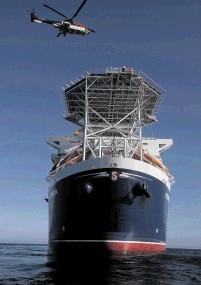
A deepwater exploration well being drilled by BP could become one of the most expensive wells in the North Sea, coming in with a price tag in excess of £100million.
The North Uist well, 76 miles west of Shetland in the Atlantic Margin, was started in March, but it has been set back by three months and could take a further three from now to complete, it is understood.
Operations on North Uist were delayed by “drilling-related technical issues”, according to Faroe Petroleum, which has a 6.25% stake in the well.
BP, the operator with a 47.5% stake, had originally said the well bring drilled by the Stena Carron drillship, in water depth of 4,235 feet, could take about three months, and potentially about six, however, it is now understood operations, in their sixth month, could yet carry on for a further three.
Brian Nottage of oil and gas analyst Hannon Westwood said drilling west of Shetland was notoriously difficult and expensive, attracting only the major companies with the capability and cash.
Last year, Chevron completed drilling on its west-of-Shetland Lagavulin prospect, also using the Stena Carron. It took an estimated 260 days, pushing the cost of the unsuccessful well up to £176million, due to technical difficulties and the geology, according to Faroe, which was also a partner.
It is thought day rates on North Uist could be similar to the Lagavulin well.
Mr Nottage said: “It is a frontier exploration area, still, and it is much more exposed out there than it is in the North Sea.
“Environmentally it is a much tougher place to do business; there are more things that can cause you problems. It is full on.”
While others have failed west of Shetland – in 2008 and 2009 Shell drilled two wells on the South Uist prospect and failed to make commercial discoveries – other firms have had success. Chevron is working up development plans for its Rosebank discovery and Total is building infrastructure for the Laggan-Tormore find, including a new gas plant in Shetland and pipeline others will be able to access.
The BP-operated Foinaven field, 118 miles west of Shetland, was the first field to be developed in the area; discovered in 1992 and brought on stream using a floating production vessel in 1997.
The area was recently given a boost by a new tax incentive, giving tax relief to qualifying deepwater fields west of Shetland, which would include North Uist.
A BP spokesman confirmed yesterday the well had been delayed due to technical drilling issues, but said the firm was making no further comment.